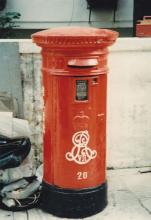17 Dec 1941, Harry Ching's wartime diary
Primary tabs
A domestic problem presented itself. With my sister's family of six, our household already numbered fifteen. Now my wife's sister-in-law telephoned. Her district (Tai Hang) has been heavily shelled and she and her son wished to join us. We agreed; but a large party of her neighbours came too, and our flat is crowded, with a total of about thirty people. They sleep where they can, in the hall and on the stairs; but they have brought their own food and give no trouble.
The authorities had hoped to induce the homeless and the displaced to disperse into the Island's rural districts, where they would be safer. But people prefer to keep close to the nerve centre and to the Government. There, they assume, food supply and police protection will be better. The Central district would probably be the last place to be lost and looted. Anyway, there is no transport. Accordingly, in the Central district, people are now living in the arcades and corridors of the large office buildings. They seem to lack all sense of sanitation. The hotels are also crowded with displaced residents and with the nervous who have left their homes to be as close as possible to the conventionally safe centre of this unprecedented typhoon.
In the air raid shelters similar conditions obtain. From the beginning hundreds of Chinese, mostly poor, had taken up residence in the tunnels, preferring of course to squat near the entrances. There are no sanitary conveniences and the shelters have quickly become filthy; the authorities daily send squads of coolies to cleanse and disinfect them and the big office arcades.
Breakfast this morning was eaten to the thunder and rattle of a heavy bombardment, directed mostly at the Central district. The Hongkong and Shanghai Bank was hit, also the Gloucester Hotel.
The shelling paused again while the Japanese sent over their second peace mission. Announcement: "The Governor received to-day a letter from the Japanese military and naval authorities repeating the suggestion that he should enter into negotiations for surrender. The Governor informed the Japanese authorities in reply that he was not prepared to receive any further communications on the subject."

